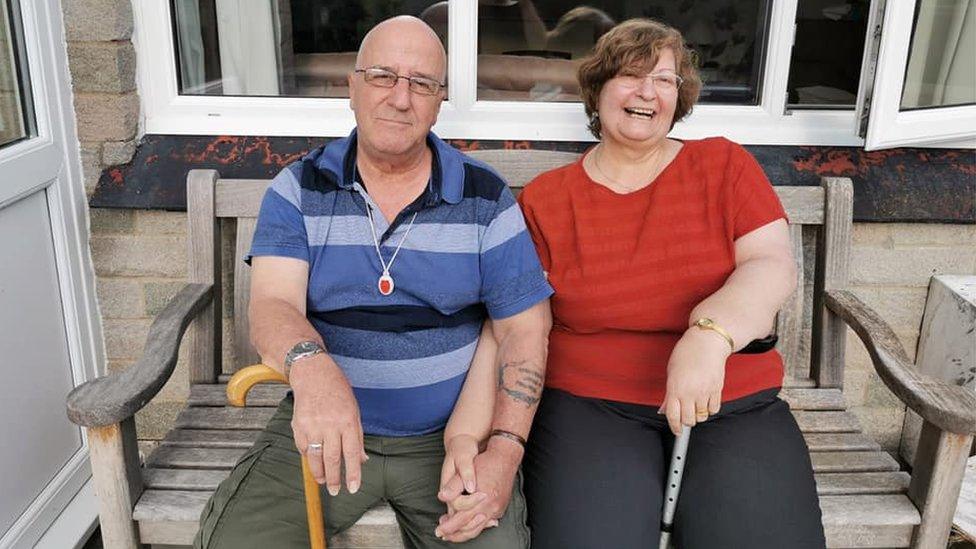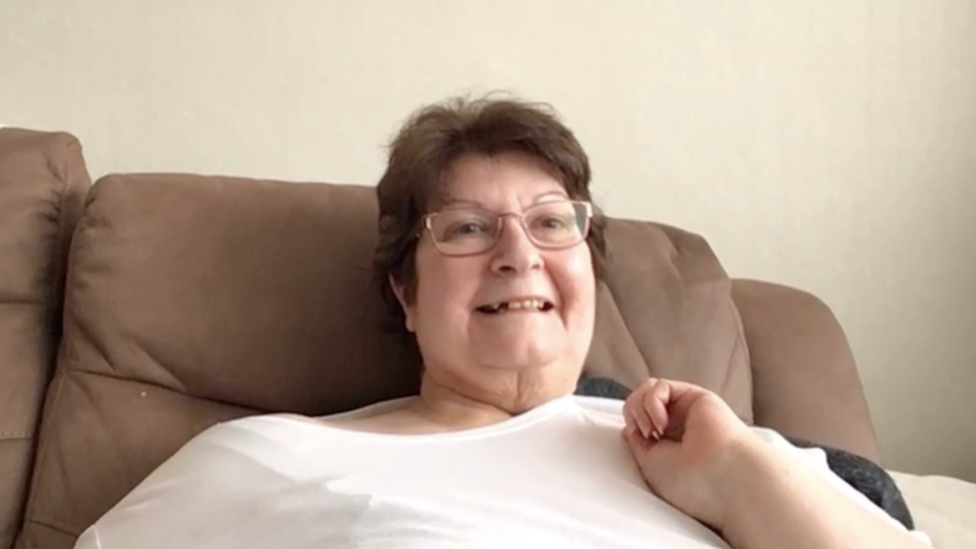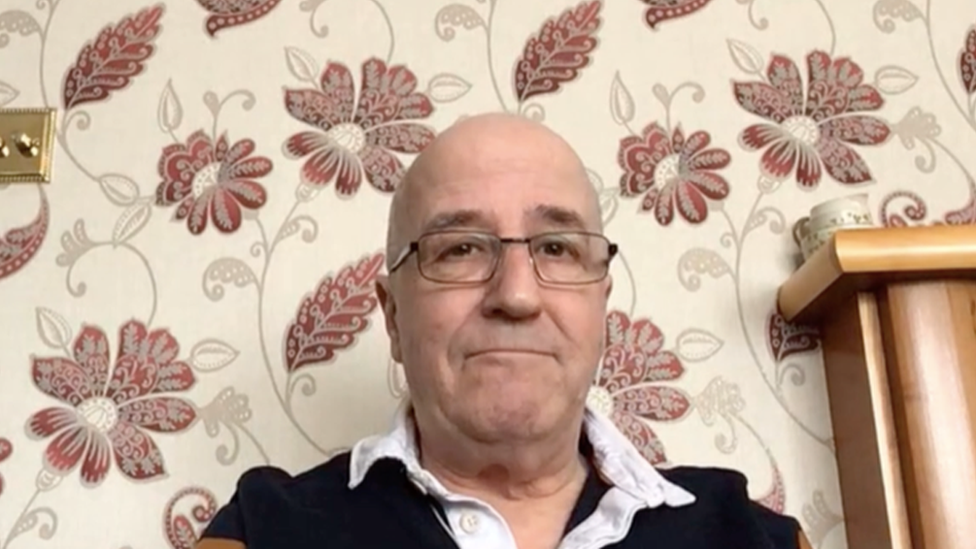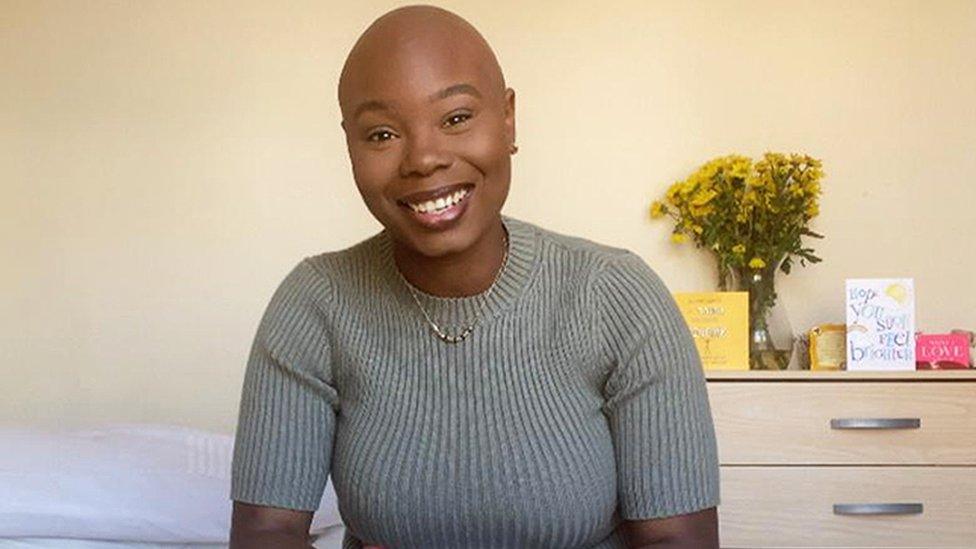'Covid stops my wife who has terminal cancer make memories'
- Published

Chris Shaftoe says the couple should be "making the most" of the time Maggie has left
"She's got close to two years left, so every day Maggie wakes up is a bonus."
Life with a terminal illness during the coronavirus pandemic and being in lockdown has caused difficulties for one couple making final memories.
Grandmother Maggie Shaftoe, who lives near Aberystwyth, has a terminal brain tumour and doctors have told her she has less than two years to live.
Macmillan Cancer Support said it was an "acutely challenging time" for those living with a terminal diagnosis.
The 63-year-old great-grandmother was diagnosed with an Anaplastic Pleomorphic Xanthoastrocytoma, external (APXA) brain tumour in 2017, which is described by Cancer Research, external as "very rare".
APXA tumours most commonly occur in children and young people and the charity say the average age for diagnosis is 12 years old.
Mrs Shaftoe said that she has not seen her 11 grandchildren and great-granddaughter for more than a year and she's "just waiting for things to get back to normal".
Her cancer was discovered four years ago by chance through a regular epilepsy check up and an MRI scan.

Maggie Shaftoe was diagnosed with a terminal brain tumour four years ago
Mrs Shaftoe and her husband Chris are childhood sweethearts and have been together for more than 50 years and he said at this stage they "should be making the most of the time she has left and making memories with our family".
"I think we'd like to go somewhere like Disneyland, or Lapland to see the northern lights or she'd love to go to the Cheddar Gorge," said Mr Shaftoe, 65.
"But the pandemic has buried us in a great big hole and I don't expect the situation to change.
"We're noticing that Maggie's memory is fading quite quickly now and she is getting worse day by day, and we understand what is coming," he said.
She underwent an operation to remove the tumour in 2017 and had radiotherapy the following year.
But Mr Shaftoe, who lives in the Ceredigion village of Bow Street just outside Aberystwyth, said this has only "delayed the inevitable" and his wife's life expectancy "hangs on the effectiveness" of two anti-cancer drugs.
Since the operation, she has suffered difficulty with her memory, impaired speech, balance problems and is partially blind.
'Devastating impact'
Doctors have told the couple that typically life expectancy for an patient with APXA would be five years.
Cancer Research UK said that the pandemic has had a "devastating impact on the lives of cancer patients".

Chris Shaftoe says everyday tasks - such as making dinner can be a "major headache"
"Dealing with a cancer diagnosis and treatment is extremely difficult at any time, but the pandemic has added the stress of uncertainty, delays and shielding for some cancer patients," said the charity's head information nurse Martin Ledwick.
Despite the circumstances, Mrs Shaftoe remains positive and says it helps to laugh.
"If you can make a joke of something, make a joke of it," she said, speaking during Brain Tumour Awareness, external month.
"You go out to make a cup of tea and you end up peeling potatoes, and come back in and wonder why I haven't got a cup of tea - you have to laugh at silly little things."
The couple have been together for nearly 50 years, since first meeting as teenagers in a church choir in London.
Mrs Shaftoe says they have "always been able to make each other laugh" with lots of jokes and teasing.
However coping during lockdown has been "very difficult" and everyday tasks like washing clothes, dealing with letters, or making dinner could be a "major headache", according to her husband.
Mr Shaftoe, who himself has ongoing medical conditions, said a carer now comes to help for an hour in the morning.
But he said: "We need more care. We have spent most of the pandemic without a carer and it has been absolutely nightmarish trying to get Maggie one."
'Challenging time'
Macmillan Cancer Support in Wales said it has heard from many people about how the isolation everyone has been experiencing has made "a challenging situation even more difficult".
"We know this is an acutely challenging time for people with cancer, the NHS and cancer care, and particularly for people who are living with a terminal diagnosis," said Richard Pugh, Macmillan's head of partnerships.
Ceredigion council said that while it was unable to comment on individual cases, assurance could be given that "anyone who has needs for care and support are assessed appropriately under the requirements of the Social Services and Wellbeing Act".
It also said that the council has "maintained delivery of care services" throughout the pandemic" and supported "in house as well as commissioned care providers to provide care to individuals within the community maintaining the safety and wellbeing of the care staff as well as the recipient of the care".
If you are being affected by issues raised in this article, help and support is available at BBC Action Line.
Related topics
- Published16 March 2021

- Published23 December 2020

- Published16 February 2021

- Published7 February 2021
